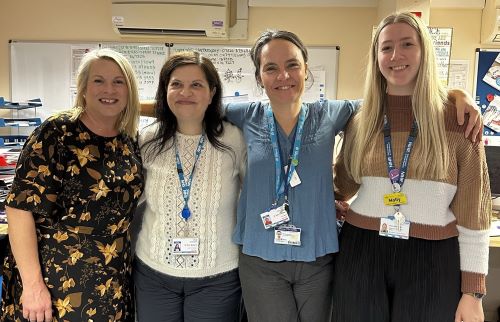
Wednesday, January 8, 2025
A research project at Frimley Health hopes to break down barriers and make it easier for people to take part in important trials.
The CONSENTOR study aims to enable people with neuroimmunological conditions, such as multiple sclerosis (MS), neuromyelitis optica and others, to participate in research. These are conditions where the body’s own immune system becomes ‘mis-programmed’ and attacks the brain, spinal cord, nerves or muscles and may be associated with significant disability.
Patients with these conditions are often keen to contribute data, such as blood tests and MRI scans, to researchers working on possible treatments. Yet collecting this information has been made difficult due to the time involved entering it into separate research projects, each requiring a new consent form.
To change this, the CONSENTOR (Combined One-off Neuroimmunological conditions Study and trial Eligibility Notification Tool and Observational Research) project is trialling a different approach. A single unified form allows different levels of consenting, depending on how much information people are comfortable sharing.
“People can sign up for local research, to be part of other trials, or have anonymised data sent to national registries,” said Ruth Geraldes, consultant neurologist and principal investigator of the study. “It allows patients with multiple sclerosis and other neuroinflammatory disorders to agree to participate in research at different levels.”
By creating a database using only a single form, the project could increase the number of people contributing information to registries and local studies, improve the speed of trial recruitment and allow better access to both trials and registries for under-served populations, thereby improving overall representation.
“Creating a research database for people with neuroimmunological conditions is important to further the knowledge about these conditions and advance treatment,” said Ruth.
“You can’t start doing trials without a database. You need to know who the patients are, what condition they have, where are they in the community, who is eligible for which trial. We need to make sure people understand how important this is, so we can bring the research forward.
“The only way to get data comparing the efficiency of different drugs, for example, will be to have real world data from a range of diverse patients, which can happen thanks to a project like this. I think it could prove to be the way forward for many other medical conditions.”
The project has been one of the highest recruiting research studies at the Trust this year. Ruth said hard work by the team had already recruited 40% of people with MS across the Frimley Health community, and they were aiming now to reach those often under-represented in studies.
“Frimley Health has been the second trust [after Cambridge University Hospitals, which launched the study] to embrace this project. We hope it will improve clinical care locally and break down barriers for patients to participate in research, including those not traditionally included in research projects,” she said.
Pictured above: Judith Wilton, MS specialist nurse; Silvia Messina, consultant neurologist; Ruth Geraldes, principal investigator for the CONSENTOR project; Holly Wetherell, research operations co-ordinator

